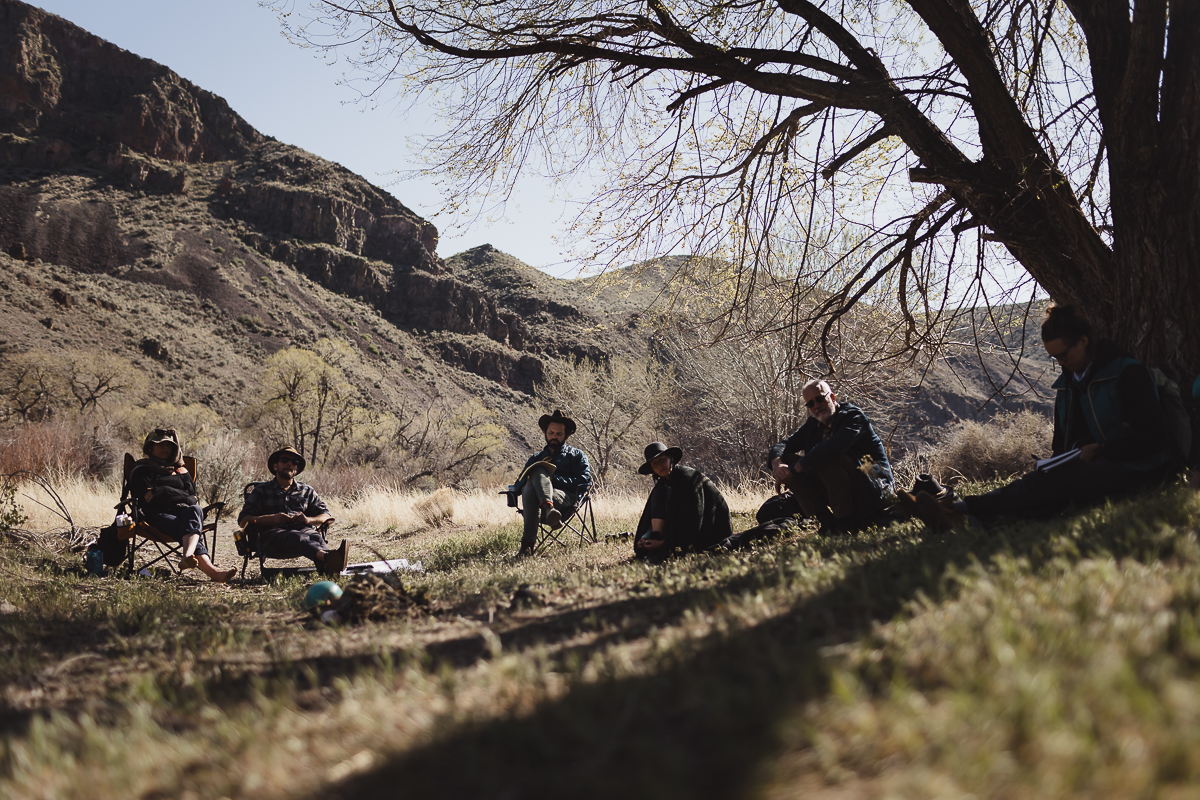In 2015, I traveled as an invited guest to the Black Hills of South Dakota, invited by a friend and colleague to help facilitate circles among the participants and Buddhist leadership of the Zen Peacemakers. More importantly, though, I was going to Bear Witness to sites and stories that were markers of the historic and ongoing genocide against the native people of what is now called North America, and of the indigenous peoples around the world. In 2018 and 2019, respectively, Miriam and I returned for more intimate journies with Lakota elders, direct descendants of family murdered by American soldiers at Wounded Knee, to walk and to listen among the sacred sites of the Black Hills, and to visit their home and language school on the reservation at Cheyanne River Reservation.
One moment stands out for me. I was sitting with my wife (pregnant with our first child) at the base of Devil's Tower (called Mato Tipila in Lakota). Our group, made up of participants like me, Buddhist teachers and leaders, and our Lakota hosts, sat on either side of a paved tourist trail. For many hours we perched on boulders or avoided poison ivy while sitting on the forest floor. We listened to the mythical stories of the landscape mixed in with the historical and personal tragedies of white settler impact on the Lakota people, and the current stories of both cultural renewal and the daily joys and struggles of the reservation.
A steady stream of tourists walked between us, many struck by the large, commanding, and strikingly warm figure of one of our hosts, Manny. Some tourists stopped and took pictures. Others walked by non-plussed. Others stopped and waited for one of our hosts to give permission to pass. A number of the passers-by wore shirts from other South Dakota tourist spots. More than one with the name of Custer, a violent and ruthless American leader of the Indian Wars, and the one who declared the gold rush in the spiritual home of Lakota that secured their removal from the Black Hills.
As I sat next to the tourist trail at this sacred place, I realized how desperately I wanted to be on the side of the "victims," who I saw as our hosts. I wanted the wearers of these shirts, the people who simply saw Devil's Tower as a stop on their tourist route, the ones who saw our hosts as part of their tourist spectacle, to be called out. I wanted to be a rescuer here. The white man with the open bleeding heart. I was not, though. I was sitting there with ideas and an imagined identity that was actually protecting me from the profound complexity of the moment; from the "full catastrophe" of all I was taking in.
Every time Manny offered a wide smile and grin to the passers-by, I fell further into not-knowing. What I was experiencing was not compatible with simple ideas of right and wrong, of victim and perpetrator, of "us" and "them." What I perceived as his warmth and welcome to all who passed, broke me. I felt the ground of these simplified identities becoming more fluid. I felt myself falling between the crags of the rocks we sat on. I actually began to fall ill and left the group with tears in my eyes.
These tears washed away just enough of what I expected, and who I thought I was here, to be open to the experiences that followed. I couldn't hide behind my ideas of right and wrong. I couldn't mask my role in what was happening, and what had happened, to the people who were so graciously opening their lives to us. Instead, I was standing on the groundless ground of not-knowing. Later in the week, I carried this openness and vulnerability to the top of another sacred site, Bear Butte, I heard a deeper call to the heart of what is becoming We are Open Circle. I felt there was still an irresistible place for magic in my reality and the work I was doing.
This month, We are Open Circle formalized our affiliation with Zen Peacemakers International. While our work is very different in its manifestation, this affiliation is an expression of the core alignment we have with ZPI's three tenants in our work with leaders, organizations, and communities.
While We are Open Circle brings a plethora of organizational development, training, and leadership tools to our work, we always begin by practicing and cultivating practices of open-minded and open-hearted listening. We work with our partners and clients to bear witness to the current reality of their work and environment, and we walk beside them in constructing the steps toward the reality they envision.
Read more about our partnership here.
Send me the latest blog post

More posts
Beyond Listening Series: Sharpening the Blade — Seeing the World at the Edges


Beyond Listening


Fierce Hope


Found


Stay in Touch
Sign-up for the Open Circle newsletter to receive updates on upcoming classes, events, and much more.






